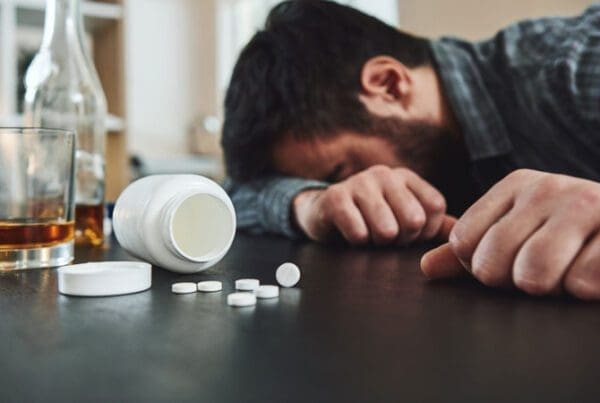Table of Contents
Alcoholism is the term most people use to discuss an Alcohol Use Disorder (AUD). AUD is described as when someone develops a pattern of using alcohol which includes issues controlling their drinking, being obsessive with thoughts of alcohol, or even continuing to use alcohol when it causes problems in their life. While AUD can be mild, moderate, or severe, any stage could cause life-altering effects.
Signs of an Alcohol Problem
There are many signs of people with AUD. They may vary from person to person, but some of the most common are:
- Obsessive thinking about alcohol- When or how you can have your next drink
- Trying to plan your time around when you can drink
- Withdrawing from social situations
- Loss of interest in hobbies, work, or family events- Especially if there is no alcohol involved
- Not being able to limit your alcohol intake
- Developing a tolerance, so you need more to feel alcohol’s effects
- Wanting to cut down on how much you drink but can’t
- Having withdrawal symptoms if you don’t drink
If you are experiencing any of these symptoms, it’s time to dive deeply into your life. Admitting you are suffering from an AUD is the first step in getting help, becoming healthier, and finding yourself again!
When to Seek Treatment
Knowing when to seek treatment is one of the toughest parts of AUD. When you are in the throes of addiction, your foggy brain can trick you into thinking you’re fine when you are not. So, how do you know when it’s time to seek treatment?
The first step is to re-read the list above. Do any of those feel like you? Maybe those don’t, but there are a few other ways to decide it’s time to seek treatment.
- Are your friends/family telling you you’ve gotten out of control?
- Are your loved ones telling you they are worried about you?
- Has your body changed since you started drinking?
- Do you have trouble sleeping without drinking?
- Are you putting yourself or others at risk with your decisions while drinking?
- Have you blacked out while drunk or lost time when drinking?
A yes to any of these questions is a pretty good indicator that you’d benefit from seeking treatment. Treatment for AUD is not a one-size-fits-all. Even though most treatment plans follow the same 3 stages, the plan can still be individualized to fit your specific needs.
The 3 Stages of Alcoholism Treatment
Most alcoholism treatment plans include 3 stages, but each plan looks a bit different, depending on your personal needs. Starting with the first stage, detox is necessary for most people suffering from AUD because alcohol can cause physical damage if you quit cold turkey.
Stage 1: Detox
Detoxing in a medical facility is the safest, most compassionate option to start your treatment journey. Because detox is when alcohol is completely flushed out of your body, you can experience many physical symptoms that can be uncomfortable. Physical withdrawal & detox symptoms can include anxiety, sweating, nausea, insomnia, tremors, disorientation, hallucinations, delirium tremens, or even seizures.
Detox can take anywhere from 3 days to two weeks or longer, depending on the severity of your AUD. But don’t let that deter you! An experienced team to help you through this process lessens your chances of a rough detox.
Stage 2: Rehabilitation
After completing stage 1, your plan will include rehab. There are many options for rehabilitation with an Alcohol Use Disorder. Absolute Awakenings offers Partial Care, Inpatient, and Intensive Outpatient services.
Inpatient Treatment
Inpatient Treatment or Residential Treatment are programs requiring you to check in and stay 24 hours a day at a facility. The benefits of inpatient treatment are vast, but having medical and other staff on call is why this is the most popular option.
Inpatient is the method that helps with long-term sobriety the most. Typically they offer a set schedule that is clinically proven to help with success in sobriety for AUD patients. The schedules usually include meals, counseling, therapies, and other planned activities.
Partial Care
Partial Hospital Programs (PHP) are also referred to as day programs. PHPs can provide intensive care for addiction and mental health disorders without requiring you to stay overnight. These programs offer a more intensive level of care than Outpatient Programs. You would travel to and from the facility daily (3-5 days a week, depending on your plan) and return home each night.
This program can either be a step down from an inpatient treatment plan or a way to start addiction treatment instead of going into inpatient rehab immediately.
Intensive Outpatient
Intensive Outpatient (IOP) is a flexible program that can be great for patients with a stable home environment. IOP is also used as a step-down from inpatient treatment programs. Outpatient programs consist of scheduled sessions at specific agreed-upon times. This way, they can fit your unique schedule.
To find which would fit your needs the best, our admissions team will happily create a plan.
Stage 3: Maintenance
After completing stages 1 and 2 of your treatment plan, the next step is a maintenance plan. Maintenance means to continue. You aim to continue being sober, bettering your life, and growing into the healthiest version of yourself.
Maintenance plans can include specific therapies or counseling, sometimes individually or involving others in a group setting. Get a sponsor to be your accountability partner and encourage you when needed. Also, attend group meetings, such as Alcoholics Anonymous. Finding the right maintenance program can take some time, but it’s necessary for long-term recovery.
What is the First Step to Treating Alcoholism?
All alcohol Use Disorders are different, but the first step is always the same. Step 1 is admitting you have a problem. Admit it to yourself out loud. Then tell a loved one, so you have support and accountability. If you don’t feel strong enough to get treatment, ask your loved one to help you. All it takes is a click of a mouse or a phone call.
Building a Plan
Building a plan to start your journey of recovery from AUD is what our admissions team is here for. You can ask any questions you may be thinking of. No question is unable to be answered! At Absolute Awakenings, we care about your needs and can help you figure out the best course of action, from learning how to cover the cost of AUD treatment, which path is right for you, and how to make the steps into a new life. So call us today, and let us help you with your recovery.
References
- Nehring SM, Freeman AM. Alcohol Use Disorder. In: StatPearls. StatPearls Publishing; 2022. Accessed January 15, 2023. http://www.ncbi.nlm.nih.gov/books/NBK436003/
- Alcohol use disorder – Symptoms and causes. Mayo Clinic. Accessed January 15, 2023. https://www.mayoclinic.org/diseases-conditions/alcohol-use-disorder/symptoms-causes/syc-20369243
- Treatment for Alcohol Problems: Finding and Getting Help | National Institute on Alcohol Abuse and Alcoholism (NIAAA). Accessed January 15, 2023. https://www.niaaa.nih.gov/publications/brochures-and-fact-sheets/treatment-alcohol-problems-finding-and-getting-help
Absolute Awakenings Treatment Center Editoral Guideline
At Absolute Awakenings, we take information integrity seriously. We have dedicated our resources to ensure that all content published to our blog is medically sound. As such, all content on our blog has been thoroughly reviewed by a doctorate level clinician such as a Medical Doctor, or Psy.D, so that you can trust all of the data we publish.







